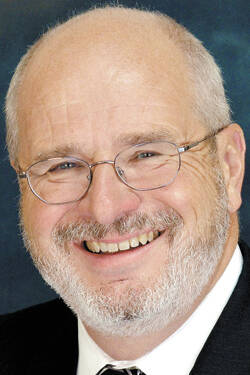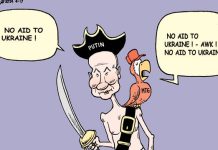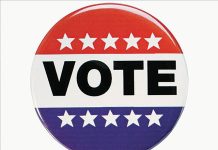The man who holds the door open while I help my father into the Veterans Affairs Outpatient Clinic wears a cap that says he’s a veteran of the Korean War.
As I smile my thanks to him while helping my almost sightless father negotiate his walker and his way into the building, the man in the Korean War cap smiles back and stands ramrod straight, almost as if he still were at attention.
Some habits must be hard to break.
My father and I have been to many VA medical facilities in recent years. Dad’s now in his mid-90s.
Even when he was young, his eyesight always was a challenge for him. Possessor of an eye disease that is both serious and hereditary, he has struggled his whole life to find ways to see well enough to take part in the activities he loved.
Somehow, despite his ailment, he was able to excel at sports — bowling, pool, pitching horseshoes — that require superb eye-hand coordination. Perhaps that’s because he always had a determination to participate and thus always found a way to cope.
I’ve often wondered where that will of his came from.
Was it his upbringing — spending a fair slice of his childhood in an orphanage? Was it growing up during the Depression?
Possibly.
But on this day, I find myself pondering how his time in the military in the waning days of the World War II era shaped him. He didn’t see combat. He was stationed in the Aleutian Islands, a lonely, isolated spot, for most of a year.
Did that time encourage him to find reservoirs of resilience that might otherwise have gone undiscovered?
Part of the reason I think that is what I see on this visit to the VA — as I have seen on all our other visits — many other veterans. Most now are younger than Dad, men — and some women — who served in Korea, in Vietnam, in the first Gulf war or in the long war on terror.
Many carry with them serious wounds or other afflictions from their time in uniform. They come from every corner of Indiana and America. They are of different races, different faiths, different genders, and different backgrounds.
The only quality that seems to link them is one of taciturnity, of stoic resolve to confront hardship without flinching.
In the times I’ve been with Dad to VA facilities, I have seen veterans who were in everything from ongoing discomfort to great pain.
But I’ve not heard one of them complain.
That’s the case now.
As Dad and I sit in the waiting room, I see vets of all ages arrive and wait patiently in line to check in. Some are in wheelchairs. Others are on crutches or wearing corrective boots. Still others have arms in casts or slings.
We’re here on the day after Memorial Day, when we Americans remember our fellow citizens who made the ultimate sacrifice in defense of this nation, its interests, and its people. It is, to echo Abraham Lincoln, altogether fitting and proper that we do so.
But, as I look at the men and women who move in and out of this VA clinic, I’m reminded of how many other sacrifices we Americans see every day, every hour, maybe even every few minutes without realizing it.
The folks in this clinic are people just like us. They come from the same places we do, walk the same streets, and go about living their lives, just as we do.
I wonder as I watch them if that quality of theirs that is so easy to admire — that sense of taciturn stoicism — also makes it hard at times for us to fully appreciate just how much they gave to serve us.
As Dad and I prepare to leave, another vet opens the door for another elderly man, this one in a wheelchair.
Like the man in the Korean War cap, this guy also smiles and stands ramrod straight, almost as if he were at attention.
Some habits must be hard to break.





